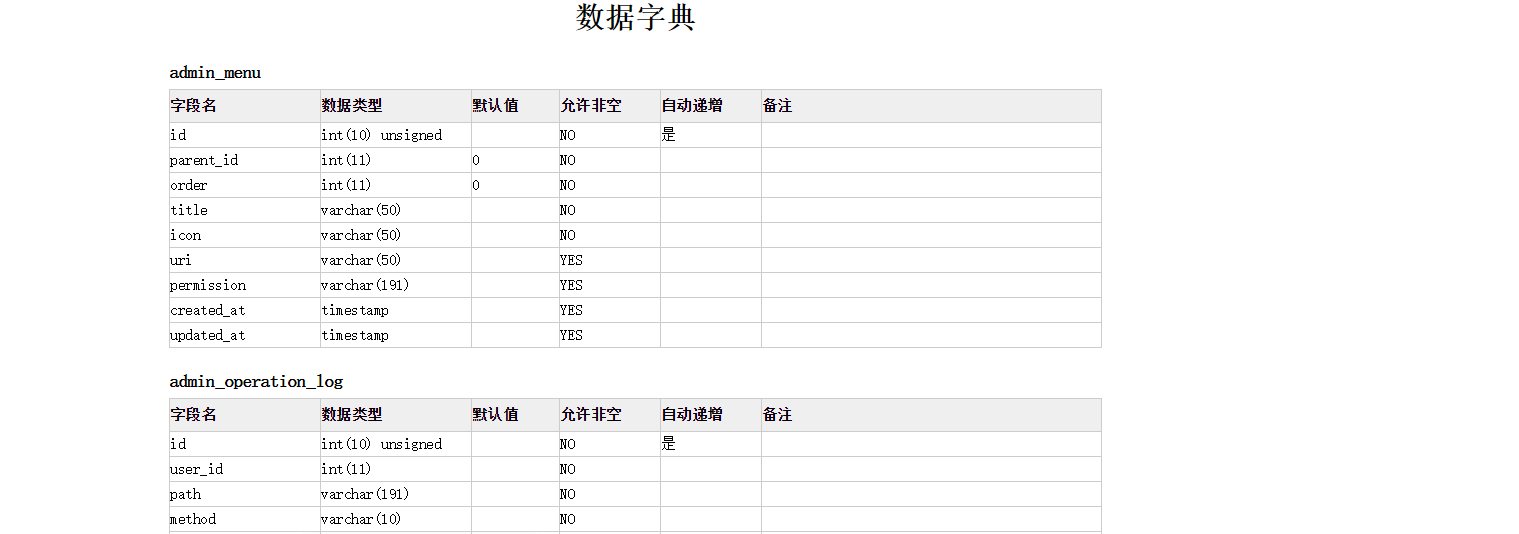PHP使用mysqli函数生成数据字典
我们做开发的时候 ,也许经常会遇到对数据库分析,做一个数据字典,下载数据库字典工具太麻烦,那么我们可以用php的函数mysqli函数生成数据字典。
效果如下

那么接下来直接上代码,只需要改几个简单的参数就可以了。
<?php /** * 生成mysql数据字典 */ //配置数据库 $dbserver = "数据库地址"; $dbusername = "用户名"; $dbpassword = "用户密码"; $database = "数据库名"; //其他配置 $title = '数据字典'; $mysql_conn = mysqli_connect("$dbserver", "$dbusername", "$dbpassword") or die("Mysql connect is error."); mysqli_select_db( $mysql_conn,$database); mysqli_query($mysql_conn,'SET NAMES utf8'); $table_result = mysqli_query($mysql_conn,'show tables'); //取得所有的表名 while ($row = mysqli_fetch_array($table_result)) { $tables[]['TABLE_NAME'] = $row[0]; } //循环取得所有表的备注及表中列消息 foreach ($tables AS $k=>$v) { $sql = 'SELECT * FROM '; $sql .= 'INFORMATION_SCHEMA.TABLES '; $sql .= 'WHERE '; $sql .= "table_name = '{$v['TABLE_NAME']}' AND table_schema = '{$database}'"; $table_result = mysqli_query( $mysql_conn,$sql); while ($t = mysqli_fetch_array($table_result) ) { $tables[$k]['TABLE_COMMENT'] = $t['TABLE_COMMENT']; } $sql = 'SELECT * FROM '; $sql .= 'INFORMATION_SCHEMA.COLUMNS '; $sql .= 'WHERE '; $sql .= "table_name = '{$v['TABLE_NAME']}' AND table_schema = '{$database}'"; $fields = array(); $field_result = mysqli_query($mysql_conn,$sql); while ($t = mysqli_fetch_array($field_result) ) { $fields[] = $t; } $tables[$k]['COLUMN'] = $fields; } mysqli_close($mysql_conn); $html = ''; //循环所有表 foreach ($tables AS $k=>$v) { //$html .= '<p><h2>'. $v['TABLE_COMMENT'] . ' </h2>'; $html .= '<table border="1" cellspacing="0" cellpadding="0" align="center">'; $html .= '<caption>' . $v['TABLE_NAME'] .' '. $v['TABLE_COMMENT']. '</caption>'; $html .= '<tbody><tr><th>字段名</th><th>数据类型</th><th>默认值</th> <th>允许非空</th> <th>自动递增</th><th>备注</th></tr>'; $html .= ''; foreach ($v['COLUMN'] AS $f) { $html .= '<tr><td class="c1">' . $f['COLUMN_NAME'] . '</td>'; $html .= '<td class="c2">' . $f['COLUMN_TYPE'] . '</td>'; $html .= '<td class="c3"> ' . $f['COLUMN_DEFAULT'] . '</td>'; $html .= '<td class="c4"> ' . $f['IS_NULLABLE'] . '</td>'; $html .= '<td class="c5">' . ($f['EXTRA']=='auto_increment'?'是':' ') . '</td>'; $html .= '<td class="c6"> ' . $f['COLUMN_COMMENT'] . '</td>'; $html .= '</tr>'; } $html .= '</tbody></table></p>'; } //输出 echo '<html> <head> <meta http-equiv="Content-Type" content="text/html; charset=utf-8" /> <title>'.$title.'</title> <style> body,td,th {font-family:"宋体"; font-size:12px;} table{border-collapse:collapse;border:1px solid #CCC;background:#efefef;} table caption{text-align:left; background-color:#fff; line-height:2em; font-size:14px; font-weight:bold; } table th{text-align:left; font-weight:bold;height:26px; line-height:26px; font-size:12px; border:1px solid #CCC;} table td{height:20px; font-size:12px; border:1px solid #CCC;background-color:#fff;} .c1{ width: 120px;} .c2{ width: 120px;} .c3{ width: 70px;} .c4{ width: 80px;} .c5{ width: 80px;} .c6{ width: 270px;} </style> </head> <body>'; echo '<h1 style="text-align:center;">'.$title.'</h1>'; echo $html; echo '</body></html>';

